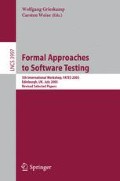Abstract
Adaptive Random Testing (ART) denotes a family of test case generation algorithms that are designed to detect common failure patterns better than pure Random Testing. The best known ART algorithms, however, use many distance computations. Therefore, these algorithms are quite inefficient regarding runtime. New algorithms combining Adaptive Random Testing by Bisection and the principle of localization are presented. These algorithms heavily reduce the amount of distance computation while exhibiting very good performance measured in terms of the number of test cases necessary to detect the first failure.
Access this chapter
Tax calculation will be finalised at checkout
Purchases are for personal use only
Preview
Unable to display preview. Download preview PDF.
References
Myers, G.J.: The Art of Software Testing. Wiley, New York (1979)
Agrawal, V.D.: When to use random testing. IEEE Transactions on Computers 27, 1054–1055 (1978)
Duran, J.W., Ntafos, S.C.: An evaluation of random testing. IEEE Transactions on Software Engineering 10, 438–444 (1984)
Hamlet, R.: Random testing. In: Encylopedia of Software Engineering, pp. 970–978. Wiley, Chichester (1994)
Loo, P.S., Tsai, W.K.: Random testing revisited. Information and Software Technology 30, 402–417 (1988)
Schneck, P.B.: Comment on “when to use random testing”. IEEE Transactions on Computers 28, 580–581 (1979)
Weyuker, E.J., Jeng, B.: Analysing partition testing strategies. IEEE Transactions on Software Engineering 17, 703–711 (1991)
Chan, F.T., Chen, T.Y., Mak, I.K., Yu, Y.T.: Proportional sampling strategy: Guidelines for software testing practitioners. Information and Software Technology 38, 775–782 (1996)
Chen, T.Y., Yu, Y.T.: On the relationship between partition and random testing. IEEE Transactions on Software Engineering 20, 977–980 (1994)
Chen, T.Y., Tse, T.H., Yu, Y.T.: Proportional sampling strategy: A compendium and some insights. The Journal of Systems and Software 58, 65–81 (2001)
Hamlet, R.G., Taylor, R.: Partition testing does not inspire confidence. IEEE Transactions on Software Engineering 16, 1402–1411 (1990)
Frankl, P.G., Hamlet, R.G., Littlewood, B., Strigini, L.: Evaluating testing methods by delivered reliability. IEEE Transactions on Software Engineering 24, 586–601 (1998)
Frankl, P.G., Hamlet, R.G., Littlewood, B., Strigini, L.: Correction to: Evaluating testing methods by delivered reliability. IEEE Transactions on Software Engineering 25, 286 (1999)
Chan, K.P., Chen, T.Y., Towey, D.: Restricted random testing. In: Kontio, J., Conradi, R. (eds.) ECSQ 2002. LNCS, vol. 2349, pp. 321–330. Springer, Heidelberg (2002)
Chan, K.P., Chen, T.Y., Towey, D.: Normalized restricted random testing. In: Rosen, J.-P., Strohmeier, A. (eds.) Ada-Europe 2003. LNCS, vol. 2655, pp. 368–381. Springer, Heidelberg (2003)
Chan, K.P., Chen, T.Y., Kuo, F.C., Towey, D.: A revisit of adaptive random testing by restriction. In: Proceedings of the 28th International Computer Software and Applications Conference (COMPSAC 2004), pp. 78–85. IEEE Computer Society, Los Alamitos (2004)
Chen, T.Y., Eddy, G., Merkel, R., Wong, P.K.: Adaptive random testing through dynamic partitioning. In: Proceedings of the 4th International Conference on Quality Software (QSIC 2004), pp. 79–86. IEEE Computer Society, Los Alamitos (2004)
Chen, T.Y., Huang, D.: Adaptive random testing by localization. In: Proceedings of the 11th Asia-Pacific Software Engineering Conference (APSEC 2004), pp. 292–298. IEEE Computer Society, Los Alamitos (2004)
Chen, T.Y., Leung, H., Mak, I.K.: Adaptive random testing. In: Maher, M.J. (ed.) ASIAN 2004. LNCS, vol. 3321, pp. 320–329. Springer, Heidelberg (2004)
Author information
Authors and Affiliations
Editor information
Editors and Affiliations
Rights and permissions
Copyright information
© 2006 Springer-Verlag Berlin Heidelberg
About this paper
Cite this paper
Mayer, J. (2006). Adaptive Random Testing by Bisection and Localization. In: Grieskamp, W., Weise, C. (eds) Formal Approaches to Software Testing. FATES 2005. Lecture Notes in Computer Science, vol 3997. Springer, Berlin, Heidelberg. https://doi.org/10.1007/11759744_6
Download citation
DOI: https://doi.org/10.1007/11759744_6
Publisher Name: Springer, Berlin, Heidelberg
Print ISBN: 978-3-540-34454-4
Online ISBN: 978-3-540-34455-1
eBook Packages: Computer ScienceComputer Science (R0)

